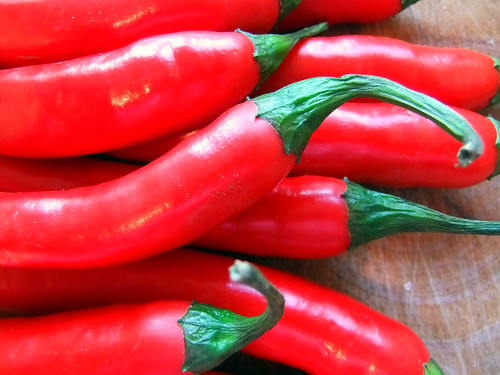9 Uses For The German Word Scharf Posted by Constanze on Jul 12, 2017 in Language
Sometimes the smallest, simplest of German words can surprise with a multitude of meanings. It’s useful to look at these kinds of words in more detail, so that they don’t confuse so much when read or heard in real life. Today the German word we’re going to look at in more detail is the adjective scharf.
If you look up the word scharf, the translation that usually comes up first is the word sharp.
‘Vorsicht! Das Messer ist scharf.’
‘Be careful! That knife is sharp.’
You could also use this when referring to braking in a car: ‘scharf bremsen’ means to brake sharply.
Another way to use it is to add emphasis to a verb. In this example, the word scharf expresses the severity of the criticism:
‘Er hat mich scharf kritisiert’
‘He really criticised me (harshly)‘
The word scharf can also be used to talk about spicy food. The word scharf means spicy. Unlike in UK English, where it can mean both, the German word heiß (hot) refers specifically to the temperature of food, and not to its spiciness. So if you want to talk about the spiciness of your curry, use the word scharf.
The word scharf can even be used to express lust or desire for someone:
‘Ich bin scharf auf dich’
‘I am into you’
You can have ein scharfer Verstand – a quick-witted, ‘sharp-thinking’ mind, or der Scharfsinn – outstanding acumen.
Even one of the letters of the German alphabet uses the word scharf! The Scharfes S (also called Esszett), which you may know as this symbol – ß – is called a ‘sharp S’ because it represents the German pronunciation of the letters S and Z (Ess und Zett!).
Scharf is also a common German surname akin to the English Sharpe. Because it is primarily an adjective, if you ever see the word Scharf capitalised, that means it is a name (a noun).
One, final note: The word scharf is a homophone for (sounds the same as) the word das Schaf – sheep. When reading German, the difference is in its capitalisation (Schaf is a noun and so is capitalised; scharf is an adjective, so it isn’t) and in the one character difference (the R). When talking, listen out for context (Ich bin Schaf auf dich – ‘I am sheep on you’ – is probably not what your crush is saying).
If you can think of any more ways the word scharf is used in German, do let me know in the comments and I’ll add them to this post. If you have any questions, don’t hesitate to comment.
Bis bald,
Constanze

Build vocabulary, practice pronunciation, and more with Transparent Language Online. Available anytime, anywhere, on any device.





Comments:
Thorsten:
Ein scharfer Verstand könnte scharf kritisieren, daß Herr Scharf scharf auf scharfes Schaffleisch ist.
🙂
(Scharf unter Schafen war “Brokeback Mountain”)
Dan:
Thanks for this. I didn’t know about usages like „scharf kritisieren”. And I’ll remember not to sweet talk a gal by telling her I’m sheep on her.
But seriously, I’m surprised that Schaf and scharf are considered homonyms. I always think of there being a little bit of R going on in the latter. Maybe not a full-fledged rolled R—in fact maybe even just a momentary lingering over where the R is.
Constanze:
@Dan I agree that some would pronounce the R and others wouldn’t, but I’m thinking from a language learner’s perspective. These words could definitely sound the same. 😉
Joseph T. Madawela:
thank you.is the “sharp” for musical notes also “Scharf”?
Constanze:
@Joseph T. Madawela Yes, it’s the same 🙂
Lukas:
@Joseph T. Madawela No, it’s not the same. In german sharp notes end in “is”.
For example “C sharp” is called “Cis”.
Similarly flat notes end in “es”.
For example “D flat” is called “Des”.
Michael:
Hi,
In English we use the word ‘sharp’ also in the sense of a wily dealer. For example, “He is a sharp dealer, be careful that you get the right value for your money.” Does German use the word in this way?
Mike
cliff1976:
Wie hätten Sie gern den Döner? Mit Scharf, oder mit ohne Scharf?